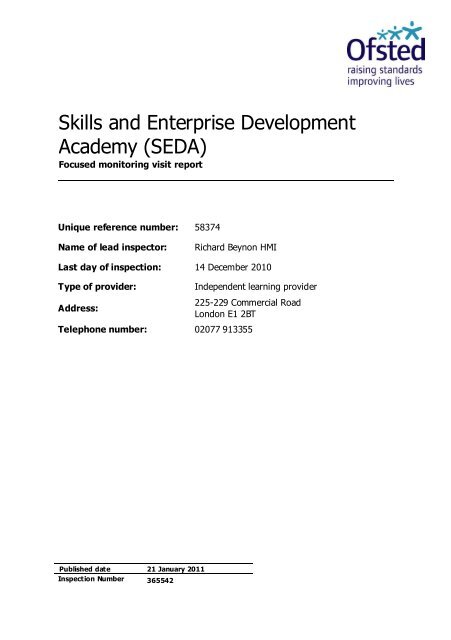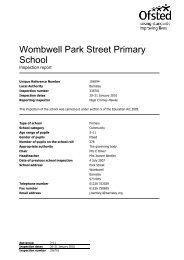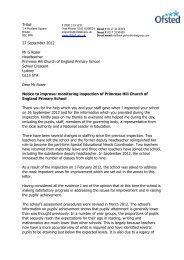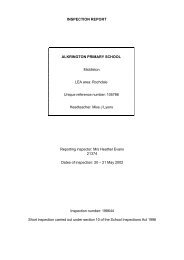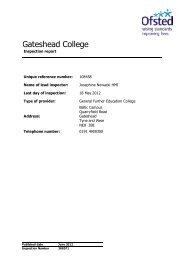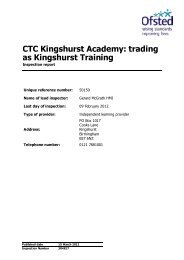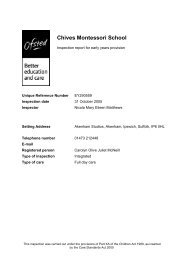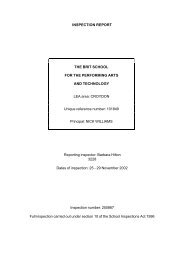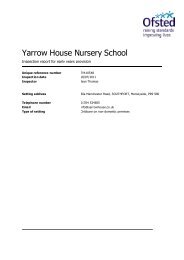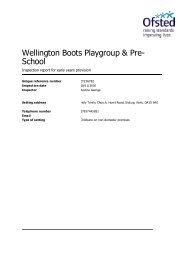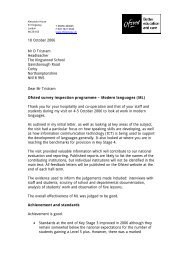Skills and Enterprise Development Academy (SEDA) - Ofsted
Skills and Enterprise Development Academy (SEDA) - Ofsted
Skills and Enterprise Development Academy (SEDA) - Ofsted
Create successful ePaper yourself
Turn your PDF publications into a flip-book with our unique Google optimized e-Paper software.
<strong>Skills</strong> <strong>and</strong> <strong>Enterprise</strong> <strong>Development</strong><br />
<strong>Academy</strong> (<strong>SEDA</strong>)<br />
Focused monitoring visit report<br />
Unique reference number: 58374<br />
Name of lead inspector: Richard Beynon HMI<br />
Last day of inspection: 14 December 2010<br />
Type of provider: Independent learning provider<br />
Address:<br />
Published date 21 January 2011<br />
Inspection Number 365542<br />
225-229 Commercial Road<br />
London E1 2BT<br />
Telephone number: 02077 913355
Focused monitoring visit: <strong>Skills</strong> <strong>and</strong> <strong>Enterprise</strong> <strong>Development</strong> <strong>Academy</strong> (<strong>SEDA</strong>), 14 December 2010 1 of 5<br />
FOCUSED MONITORING VISIT: MAIN FINDINGS<br />
Context <strong>and</strong> focus of visit<br />
<strong>Skills</strong> <strong>and</strong> <strong>Enterprise</strong> <strong>Development</strong> Agency (<strong>SEDA</strong>) is a voluntary sector not for profit<br />
training provider focusing on small <strong>and</strong> medium enterprises within minority ethnic<br />
communities.<br />
Under a contract with the <strong>Skills</strong> Funding Agency, <strong>SEDA</strong> provides National Vocational<br />
Qualifications (NVQs) at levels 1 to 4 in customer services, business administration,<br />
information <strong>and</strong> communication technology (ICT), road passenger vehicle driving,<br />
<strong>and</strong> food <strong>and</strong> hygiene. The company also provides NVQ level 3 assessment<br />
qualifications (A1), NVQ level 4 internal verification qualifications (V1), advice <strong>and</strong><br />
guidance NVQs at levels 3 <strong>and</strong> 4, <strong>and</strong> literacy <strong>and</strong> numeracy skills qualifications. On<br />
an individual level, <strong>SEDA</strong> offers tutorial <strong>and</strong> practical tuition <strong>and</strong> training, job<br />
preparation, advice <strong>and</strong> guidance, mentoring, confidence building <strong>and</strong> personal<br />
development. <strong>SEDA</strong> predominantly provides training in East <strong>and</strong> West London<br />
boroughs, but also covers wider North East <strong>and</strong> other Greater London boroughs. Two<br />
directors, two senior managers, eight assessors <strong>and</strong> trainers, <strong>and</strong> two administrative<br />
staff manage the provision. The company’s previous inspection was in October 2008.<br />
Grades were satisfactory in all areas.<br />
Themes<br />
Self-assessment <strong>and</strong> improvement planning<br />
What is the provider’s capacity to self-assess <strong>and</strong> make <strong>and</strong><br />
sustain improvements?<br />
Reasonable<br />
progress<br />
The previous inspection judged <strong>SEDA</strong>’s arrangements for quality improvement to be<br />
incomplete with many activities either informal or new to the organisation. Initial<br />
assessment arrangements are now more relevant to the learner programmes <strong>and</strong><br />
form a sound basis for further actions, including identification of any language or<br />
communication support needs. Prior learning <strong>and</strong> experience are assessed<br />
effectively, with this information used to ensure learners start at the correct NVQ<br />
level. All assessors are observed using a feedback sheet that covers the assessment<br />
process well. However, in some instances, the comments describe what the assessor<br />
did rather than evaluate how well the assessment went. A more structured approach<br />
to collecting <strong>and</strong> using learner <strong>and</strong> employer feedback has improved some of the<br />
processes <strong>and</strong> reduced bureaucracy within the training. At the previous inspection<br />
only two members of staff were qualified assessors; there are now twelve. A clear<br />
training plan is in place to increase the number of internal verifiers <strong>and</strong> the number<br />
of staff with an information, advice <strong>and</strong> guidance (IAG) qualification at level 4. All<br />
staff contribute to the self-assessment process <strong>and</strong> increasingly effective use is made<br />
of employer <strong>and</strong> learner views within the subsequent report.
Focused monitoring visit: <strong>Skills</strong> <strong>and</strong> <strong>Enterprise</strong> <strong>Development</strong> <strong>Academy</strong> (<strong>SEDA</strong>), 14 December 2010 2 of 5<br />
Outcomes for learners<br />
What progress has <strong>SEDA</strong> made in raising achievements <strong>and</strong><br />
outcomes for learners?<br />
Significant<br />
progress<br />
Significant progress has been made since the previous inspection in raising outcomes<br />
for learners. Across a three-year period, both overall <strong>and</strong> timely achievement of<br />
NVQs has risen steadily. In skills for life literacy NVQ at level 1, timely achievement<br />
has risen from 7.9% in 2007/08 to the current 79%, which is around five points<br />
above the national average. Timely completion for customer service NVQs at level 2<br />
has risen by around twenty percentage points <strong>and</strong> now st<strong>and</strong>s at 97%, which is<br />
nearly thirty points above the national average. For customer service NVQs at level 3,<br />
timely completion st<strong>and</strong>s at 100%, which is thirty-six points above the national<br />
average. These increases in success rates have been brought about against a<br />
background of significantly increased enrolments.<br />
Employers report that levels of confidence <strong>and</strong> motivation are improving as a result<br />
of the work undertaken by <strong>SEDA</strong>. Punctuality <strong>and</strong> attendance are also getting better.<br />
In one organisation, a number of learners are now eager to apply for paid work,<br />
progressing from the voluntary roles they currently have.<br />
Quality of provision<br />
What progress has <strong>SEDA</strong> made in improving individualised<br />
planning <strong>and</strong> progress monitoring for learners?<br />
Significant<br />
progress<br />
Significant progress has been made in the development of useful individual learning<br />
plans (ILPs) <strong>and</strong> meaningful monitoring systems for learners. A new ILP gives much<br />
improved planning, progress monitoring <strong>and</strong> evaluation opportunities, <strong>and</strong> is well<br />
used by assessors <strong>and</strong> managers to plan training <strong>and</strong> identify learners’ needs.<br />
Employers are fully involved in the initial planning of training at a three-way meeting,<br />
with assessor, learners <strong>and</strong> employer present to discuss needs <strong>and</strong> training plans.<br />
Employers also receive a good level of information about learners’ progress during<br />
training. ILPs are now used effectively to monitor training, along with a clear <strong>and</strong><br />
well-used learner progress tracking form. Additional training <strong>and</strong> support needs are<br />
swiftly identified <strong>and</strong> effective support is put in place. Assessors maintain clear <strong>and</strong><br />
frequently-updated records of learners’ progress, following weekly workplace review<br />
<strong>and</strong> assessment visits to learners.<br />
How has the planning for <strong>and</strong> embedding of skills for life<br />
learning been improved?<br />
Significant<br />
progress<br />
The development of skills for life provision was in the early stages at the previous<br />
inspection, with progress identified on the implementation plan <strong>and</strong> some raising of<br />
staff awareness having taken place. <strong>Skills</strong> for life are now successfully embedded into<br />
the NVQ programmes <strong>and</strong> achievement of literacy <strong>and</strong> numeracy qualifications has<br />
increased from 59% in 2007/08 to 94% in 2009/10. <strong>SEDA</strong> works well with employers
Focused monitoring visit: <strong>Skills</strong> <strong>and</strong> <strong>Enterprise</strong> <strong>Development</strong> <strong>Academy</strong> (<strong>SEDA</strong>), 14 December 2010 3 of 5<br />
when recruiting learners <strong>and</strong> makes good use of an initial screening tool to identify<br />
learners who may need to be signposted to another provider. The individual learning<br />
plan is clearly linked to the initial training plan.<br />
Learners respond well to the early identification of their strengths <strong>and</strong> areas for<br />
improvement; for some learners this is the first time their strengths have been<br />
acknowledged. The skills for life programme is very well structured, developing<br />
background knowledge followed by practice tests. Learners undertake appropriate<br />
additional activities if they do not achieve a suitable score on the practice test.<br />
Assessors have effectively incorporated skills for life activities into the main<br />
programme. Awareness training for staff is good, with the skills for life coordinator<br />
ensuring assessors are kept up to date with new developments <strong>and</strong> supplied with<br />
helpful additional resources.<br />
Leadership <strong>and</strong> management<br />
What progress has <strong>SEDA</strong> made in improving the<br />
effectiveness <strong>and</strong> use of management information systems?<br />
Significant<br />
progress<br />
Managers now engage in effective data gathering <strong>and</strong> review activities. All key staff<br />
have a good underst<strong>and</strong>ing of the progress of various cohorts of learners, <strong>and</strong> are<br />
clear about actions to maintain <strong>and</strong> improve progress. Weekly assessor visits are<br />
swiftly translated into meaningful <strong>and</strong> accessible data that allow managers <strong>and</strong><br />
assessors to act appropriately when learners fall behind with their training. Managers<br />
review progress frequently, <strong>and</strong> senior management team meetings have a clear<br />
focus on learners’ progress <strong>and</strong> success. Information systems have been well<br />
structured to produce clear reports for managers <strong>and</strong> assessors to access. All key<br />
data reports are available remotely as well as in the networked learning centre.<br />
What progress has been made in ensuring that staff have<br />
appropriate development <strong>and</strong> training for equality <strong>and</strong><br />
diversity <strong>and</strong> safeguarding matters?<br />
Reasonable<br />
progress<br />
Although equality of opportunity was satisfactory at the previous inspection, staff<br />
development was judged to be insufficient, <strong>and</strong> safeguarding arrangements did not<br />
include formal risk assessments of employers’ premises. A clear equalities policy is<br />
now in place <strong>and</strong> this is shared with employers <strong>and</strong> other partners. The board of<br />
directors sets improvement targets <strong>and</strong> effectively monitors equality <strong>and</strong> diversity.<br />
The board has a good gender balance <strong>and</strong> from January 2011 another female board<br />
member will take up a post. Staff are clear about how to deal with sensitive<br />
emotional or cultural issues <strong>and</strong>, where appropriate, a female member of staff will<br />
attend a support session or assessment. Learners are given formal opportunities to<br />
raise any concerns on at least three occasions <strong>and</strong> also have contact details of key<br />
members of staff. Learners feel well informed <strong>and</strong> comfortable about raising any<br />
concerns they may have. Good progress has been made in broadening the gender<br />
balance among learners. The proportion of female learners has significantly<br />
increased <strong>and</strong> is now at 37% compared with 8% at the inspection. <strong>SEDA</strong> has also<br />
increased the range <strong>and</strong> diversity of businesses it now works with. The routine use of
Focused monitoring visit: <strong>Skills</strong> <strong>and</strong> <strong>Enterprise</strong> <strong>Development</strong> <strong>Academy</strong> (<strong>SEDA</strong>), 14 December 2010 4 of 5<br />
data to monitor improvements <strong>and</strong> set targets is very good. Staffing reflects the<br />
culture of the local community well, although there are still too few female assessors.<br />
The organisation acknowledges this.<br />
The welfare <strong>and</strong> safety of learners is a high priority for <strong>SEDA</strong>. However, the<br />
development of formal arrangements for safeguarding is slow. Plans are in place for<br />
a key member of staff to receive training as the designated safeguarding officer <strong>and</strong><br />
regular awareness training sessions are currently being planned.
The Office for St<strong>and</strong>ards in Education, Children's Services <strong>and</strong> <strong>Skills</strong> (<strong>Ofsted</strong>) regulates <strong>and</strong><br />
inspects to achieve excellence in the care of children <strong>and</strong> young people, <strong>and</strong> in education<br />
<strong>and</strong> skills for learners of all ages. It regulates <strong>and</strong> inspects childcare <strong>and</strong> children's social<br />
care, <strong>and</strong> inspects the Children <strong>and</strong> Family Court Advisory Support Service (Cafcass),<br />
schools, colleges, initial teacher training, work-based learning <strong>and</strong> skills training, adult <strong>and</strong><br />
community learning, <strong>and</strong> education <strong>and</strong> training in prisons <strong>and</strong> other secure establishments.<br />
It rates council children’s services, <strong>and</strong> inspects services for looked after children,<br />
safeguarding <strong>and</strong> child protection.<br />
If you would like a copy of this report in a different format, such as large print or Braille,<br />
please telephone 08456 404040, or email enquiries@ofsted.gov.uk.<br />
You may copy all or parts of this document for non-commercial educational purposes, as<br />
long as you give details of the source <strong>and</strong> date of publication <strong>and</strong> do not alter the<br />
information in any way.<br />
Royal Exchange Buildings<br />
St Ann’s Square<br />
Manchester, M2 7LA<br />
T: 08456 404040<br />
Textphone: 0161 618 8524<br />
E: enquiries@ofsted.gov.uk<br />
W: www.ofsted.gov.uk<br />
© Crown copyright 2011


